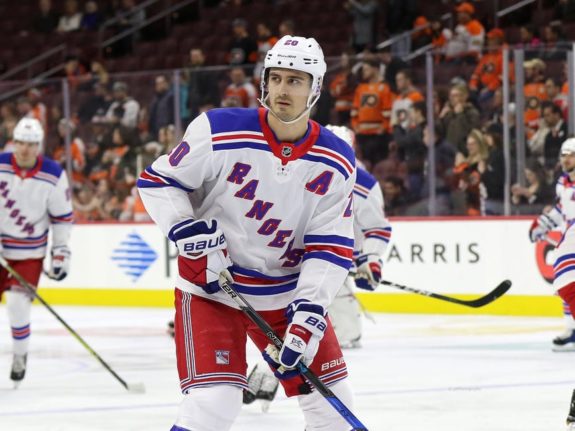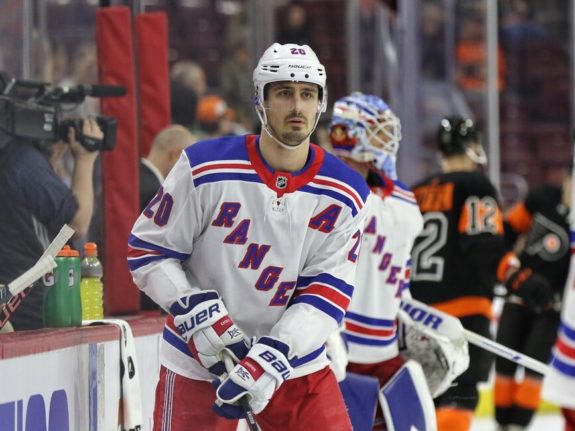While things may be turning around after winning their last two games, the New York Rangers’ season is not off to the strongest of starts. The team has shown flashes of good play, but some units have looked inefficient and some players are nonexistent. One player’s performance is parallel to the Rangers’ start, winger Chris Kreider.
Prior to last week, the Rangers’ lack of scoring was their biggest flaw. Through Nov. 3, the team has a Corsi pecentage of 43.8%, worst in the NHL, and they only average 41.8 percent of a game’s total shots, also last in the league.
Most of the team’s scoring has come from five players. Mika Zibanejad and Artemi Panarin, both with 11 points, are not surprising. As for the rest of the team, there’s not a whole lot of production outside of Ryan Strome (11 points), Pavel Buchnevich (eight points) and Tony DeAngelo (eight points).
A Slow Start for Kreider
Just last season, Kreider was considered one of the most important pieces of the team’s offense, alongside Zibanejad and Kevin Hayes before he was traded. He scored 52 points (28 goals and 24 assists) in 2018-19, his second 50-point campaign in three seasons.

Through 11 games this season, Kreider has six points (two goals and four assists) and has a shooting percentage of 8.7%. While he got off to a similar start last season and he now has three points (including his first two goals of 2019-20) in the last three games, something felt off this time around.
The New York Post‘s Larry Brooks noted that after the first week or so of play, Kreider had just three assists, all on the power play, (from ‘Rangers need Chris Kreider to find his way amid puzzling start’, New York Post – 10/15/19).
Only three forwards, who played every game like Kreider, had less even-strength ice time. He is 10th on the team in even-strength ice time (12:41) and sees more action on the power play. He’s 9th in total ice time per game (17:07) and 10th in shifts per game (20.9).
Kreider wasn’t expected to receive first-line ice time this season, after Panarin’s arrival and Buchnevich’s rise. But it was fair to assume that he’d still be one of the bigger contributors, especially with such a young, developing team around him.
Since he joined the team last season, head coach David Quinn has expressed his desire for a high-pressure offense with speed and aggressiveness and it seemed like Kreider was the perfect role model for that.

“I’ve got to continue to look for ways to manufacture speed and use my speed, whether it be through the neutral zone or on the forecheck,” Kreider told The Journal News. “I’ve got to prove it every single game — continue getting to the net, continue driving to the net, spinning the goalie, working down below the hash marks.
Just continue to work hard and do the little things. That’s how you create chances and that’s how you win hockey games — continue to get into battles, stay in the battles, win pucks and disrupt plays,” (from ‘NY Rangers’ Chris Kreider: I’ve got to prove it every single game’, The Journal News – 10/19/19) .
Playing for a Payday — Rangers or Not
Kreider’s need to consistently produce for the Blueshirts goes beyond what the team expects from him — he needs it for the sake of his future.
He is in the final year of his current deal in New York. In fact, it was uncertain if he would still be with the organization this season after Kaapo Kakko was drafted and Panarin and Jacob Trouba were acquired in the offseason. Trade rumors and trade vs. extension debates were rampant all summer, but in the end, nothing was done to his contract.
Kreider has the chance to have one more strong season with the team he’s played for his entire NHL career. If he does, he will probably be rewarded with a solid contract, regardless if it’s from the Rangers or not.
Hayes is a perfect example. He was traded to the Winnipeg Jets at last year’s deadline and his production between New York and Winnipeg earned him a seven-year, $50 million deal from the Philadelphia Flyers.
Even with his two 50-point seasons, Kreider may not get the big contract he wants if he has a disappointing 2019-20 campaign. If he’s dealt before the trade deadline, the Rangers may not get the price they want for him— as a solid rental for a contender — if his play is a letdown.
The season is still young, but the Rangers could use a boost from Kreider’s offense. Whatever may happen to the team, he needs to produce.